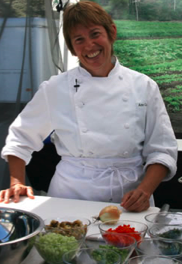Last week, I stepped back in time to have lunch in a high school cafeteria. Only this time, it was with Renegade Lunch Lady, Ann Cooper. Ann built a national reputation from her work with the School Lunch Initiative to bring healthy, whole foods into school lunchrooms throughout the Berkeley, California, school district. Now she was in Boulder, Colorado, to do the same thing. As I pulled together research for my visit, I became convinced that California’s loss was Colorado’s coup. You can have Jamie Oliver, West Virginia. We’ll take Ann Cooper.
Ann’s approach to changing school lunch is straightforward and no-nonsense. Her work in Boulder is not gradual, not for the fainthearted. She immediately implemented a daily salad bar featuring seasonal produce, replaced white breads with whole grains, banished flavored milk in favor of organic milk from Colorado cows, eliminated high fructose corn syrup, and made fresh fruits and veggies the stars of the show.
 Ann CooperWhen I was in high school, I loved the weekly routine of my school lunch schedule. For instance, I remember turkey, gravy, and fluffy white buns on Tuesdays, and Taco Wednesdays. That's too predictable for Ann; her menus rotate on a four-week cycle, with small variations from week to week. One day each week features fresh chicken, another pasta, another Mexican, but ingredients and recipes change regularly to reflect the growing season, and food is sourced locally whenever possible. The unique part of Ann’s program is that the students are engaged in the change. A sampling booth set up in the cafeteria allows students try new menus items in development; their feedback helps Ann and her team plan what will work long term. Even seemingly minor changes can have a big impact: like macaroni and cheese with actual cheese rather than powder, and cereal with half as much sugar topped with organic milk.
Ann CooperWhen I was in high school, I loved the weekly routine of my school lunch schedule. For instance, I remember turkey, gravy, and fluffy white buns on Tuesdays, and Taco Wednesdays. That's too predictable for Ann; her menus rotate on a four-week cycle, with small variations from week to week. One day each week features fresh chicken, another pasta, another Mexican, but ingredients and recipes change regularly to reflect the growing season, and food is sourced locally whenever possible. The unique part of Ann’s program is that the students are engaged in the change. A sampling booth set up in the cafeteria allows students try new menus items in development; their feedback helps Ann and her team plan what will work long term. Even seemingly minor changes can have a big impact: like macaroni and cheese with actual cheese rather than powder, and cereal with half as much sugar topped with organic milk.
Ann knows that families who support a movement toward healthy, local foods are often hesitant to allow their children to eat the lunch prepared in school — even in Ann’s schools. And yet the success of the program depends on participation. Each school lunch in Boulder costs the school $1.25, 30 percent more than the 85 to 95 cent national average. The cost is sustainable only if schools increase the proportion of students participating. Boulder’s program this year budgeted for a 10 percent increase in participation, but as the year came to a close, it only achieved a 4 percent gain. It is a promising start, but still has a way to go to catch up with the success Ann achieved in Berkeley.
When I look at Ann’s history in Berkeley and what she’s started in Boulder, I wonder how success in either of these “hippie” towns translates to change nationwide. As Ann and others pilot work in individual districts, we need to continue to create market demand for healthy, local foods that will allow us to make it easier to make better choices in every school and community.
I look forward to following the progress in Boulder. Even if the Renegade Lunch Lady hasn't made it to your school (yet), I encourage you to get to know what your kids are eating. Next September, why not plant to eat one meal with your kids at school and start a conversation with other parents and community members to ignite change in your area.

Alicia Jabbar is a self-described foodie, cook, and advocate for local and delicious foods. Alicia spent several years living in San Francisco, but last year spent seven months living and working on a farm on the East Coast. Now she's in Boulder, Colorado, where she is pursuing an opportunity to become an organic farmer. The single best aspect about food, she says, is the community it engages and the conversation it creates. We couldn't agree more. Her last post for Simple, Good and Tasty was Nothing Says Happy Earth Day Like a Big Pile of Compost.




